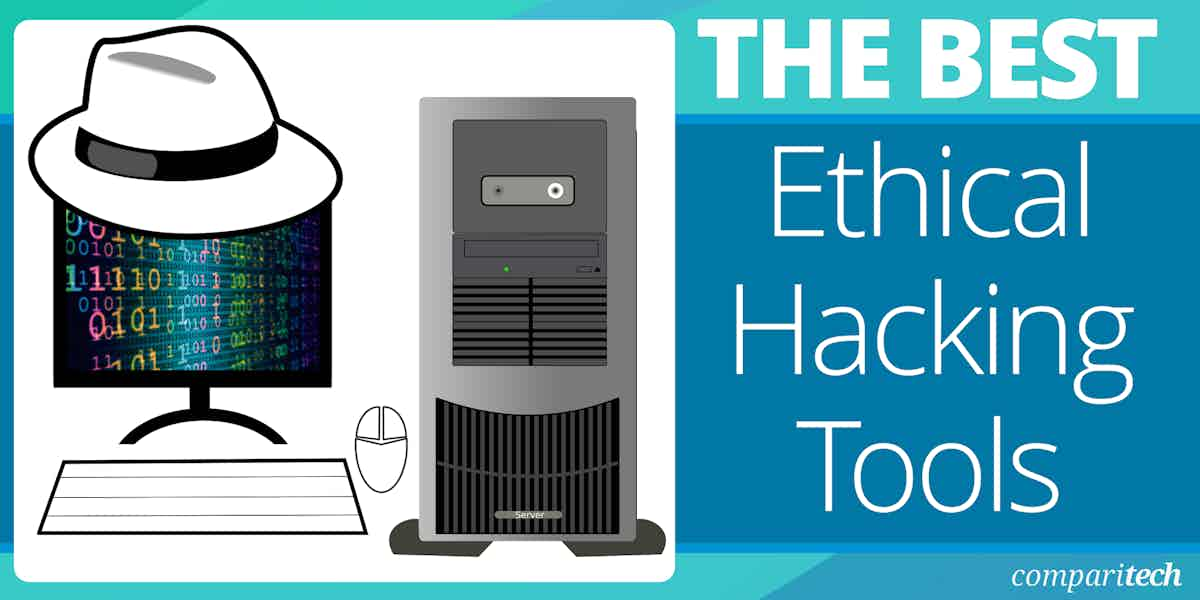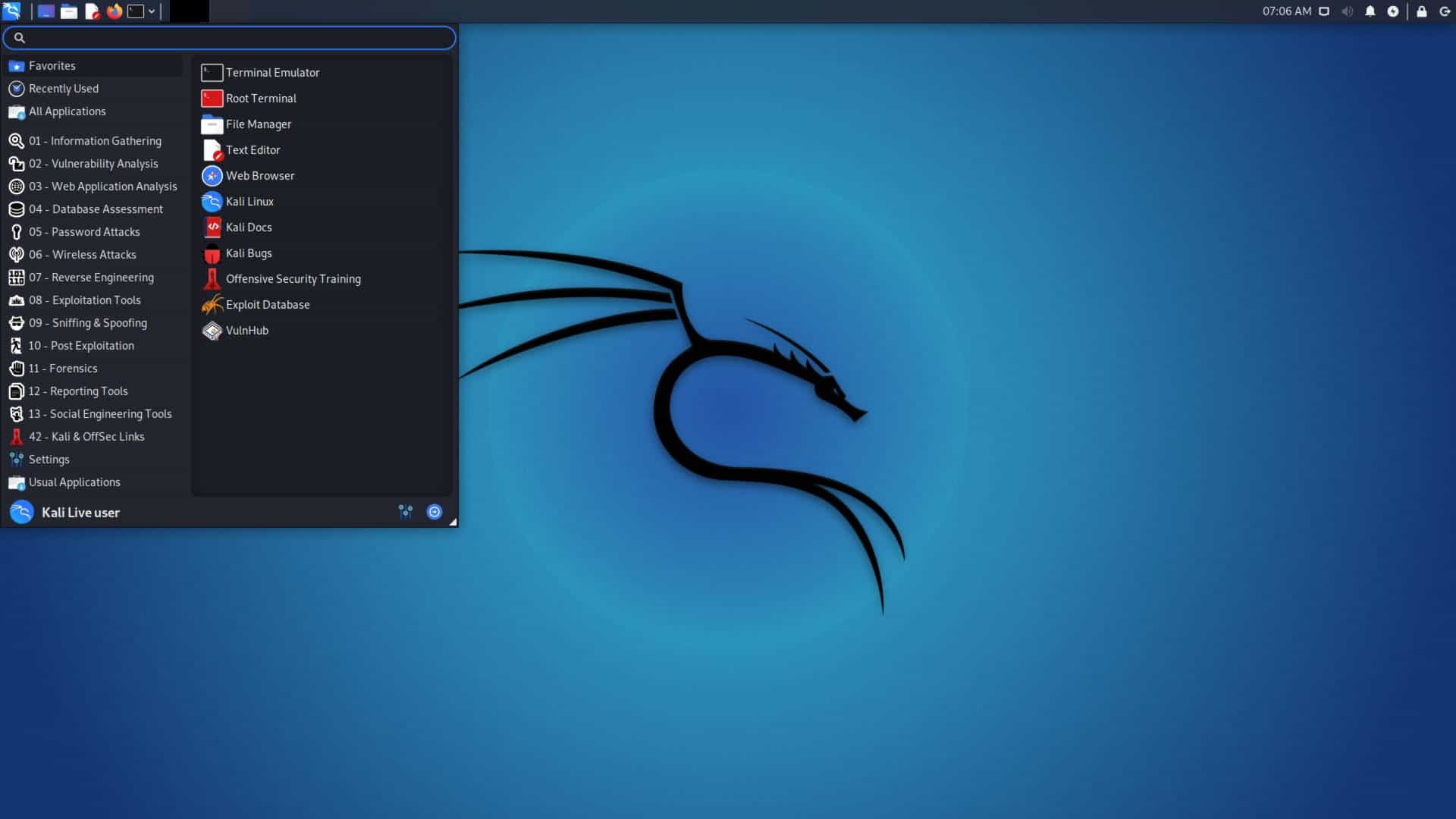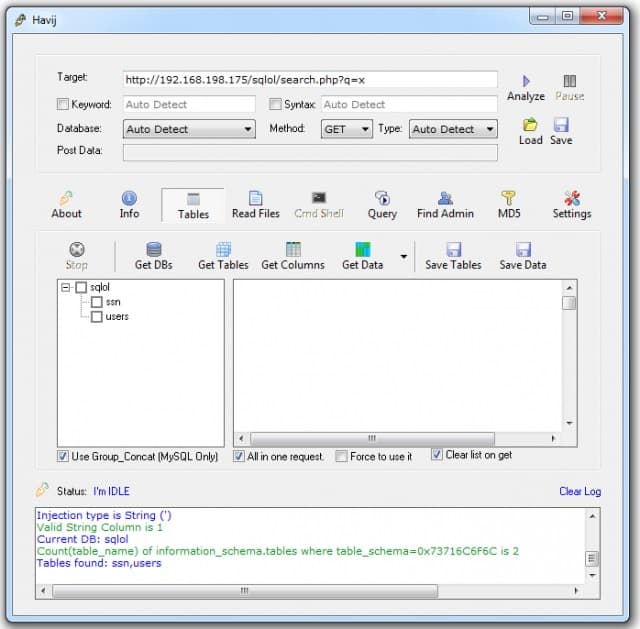Ethical hacking addresses the shortcomings of cybersecurity software. That is, the software is organized and can’t invent new methods to damage a system
Ethical hacking, also known as penetration testing or white-hat hacking, is the practice of intentionally probing computer systems, networks, or applications to identify security vulnerabilities before malicious actors can exploit them. Ethical hackers are cybersecurity professionals authorized to conduct these assessments, ensuring that their activities comply with legal and ethical guidelines.
Here is our list of the best ethical hacking tools:
- Kali Linux This adaptation of the Debian Linux operating system has hundreds of hacking tools included with it. So if you want to perform ethical hacking and you don’t have Linux, get this distro.
- Invicti A continuous testing tool for development projects that can also be used as a vulnerability scanner for Web applications. Offered as a SaaS platform or for download onto Windows or Windows Server.
- Acunetix A vulnerability scanner for Web applications and networks searches for more than 7,000 external threats and scans from within a network for more than 50,000 vulnerabilities. Available as a SaaS platform or for installation on Windows, macOS, and Linux.
- Havij An SQL injection and cross-site scripting service that also identifies databases and helps break into them. It runs on Windows.
You can read more about each of these options in the following sections.
Unlike malicious hackers, ethical hackers aim to enhance security rather than undermine it. Organizations hire them to simulate cyberattacks, uncover weak points, and provide actionable recommendations to fortify defenses. Ethical hackers use the same techniques as malicious hackers, such as phishing, exploiting software vulnerabilities, and social engineering, but with the permission of the system’s owner.
The process of ethical hacking typically follows a structured methodology:
- Reconnaissance: Gathering information about the target system or network.
- Scanning: Identifying active systems, open ports, and potential vulnerabilities.
- Exploitation: Attempting to exploit weaknesses to gain access or escalate privileges.
- Reporting: Documenting findings and recommending fixes.
Ethical hacking is vital in combating the ever-evolving threat landscape of cybersecurity. It helps organizations comply with regulatory requirements, protect sensitive data, and avoid financial or reputational harm caused by breaches.
The field has several frameworks and certifications, including Certified Ethical Hacker (CEH) and Offensive Security Certified Professional (OSCP), which set standards for professionalism and technical expertise. Ethical hacking is not limited to large enterprises; small businesses and governments also rely on these practices to safeguard their digital assets.
What are hacking tools?
Who makes hacking tools, and why aren’t they in prison? You would think that writing and distributing hacking tools should be some sort of crime, like aiding and abetting. However, many hacking tools are regular run-of-the-mill system testing tools. For example, for every system administrator and network manager user, Ping is a tool that hackers use. In addition, many of the command line information utilities you operate, such as ipconfig and arp, are hacker tools.
Information is power, and the first thing that a hacker needs is intel on your network – login credentials, in particular, would be helpful. Network discovery systems and port scanners are also very commonly used by hackers when they document a system on the search for a way in.
Another term for ethical hacking is penetration testing. An attack strategy can be planned to see how far into the tester system can get by acting like a hacker – how far they can penetrate defenses.
Hacking has been around for as long as computer systems, and so there are some ancient hacking tools out there that very old hackers use. These usually command-line utilities and use a Unix-like format with switches that feed in variables or activate options. A typical configuration for the launch of a hacker tool would be like arp -a.
Younger hackers have learned about those old tools, but they are more willing to adopt newer tools with GUI interfaces and interpret point-and-click instructions into operating system commands. So, there isn’t one single type of system that looks like a hacker tool.
The best ethical hacking tools
It is the job of an ethical hacker to act as a real-world hacker. Therefore, the best ethical hacking tools are those utilities that real-world hackers use.
Our methodology for selecting an ethical hacking tool
We reviewed the market for ethical hacking tools and analyzed the options based on the following criteria:
- A mix of command-line tools and utilities with a good GUI
- Systems that conduct research and offer support to attack strategies
- A service that can guide what system weaknesses provide the best opportunities
- A system that logs all actions for later analysis
- A mix of free and paid tools
- A chance to assess paid agencies without cost
- A fair price that gives value for money or a free tool
As well as following these selection criteria, we made sure to find tools for each operating system. We also included tools that can contribute to an attack campaign in part. The majority of the ethical hacking tools that we recommend you to try our bundled into Kali Linux.
The Best Ethical Hacking Tools
1. Kali Linux
Kali Linux is an operating system with added features. It is a version of Debian Linux with hacking tools already built-in. This is the quickest way to acquire a complete hacking toolkit for testing your system’s security. This fantastic pack of ethical hacking tools is completely free to use. These are not demo versions or free trials. Every tool in the Kali Linux system is free forever – no tricks.
Key Features:
- Complete Penetration Testing Suite: Offers an extensive collection of tools tailored for penetration testing, ensuring comprehensive security assessments.
- Over 300 Tools: Provides a vast selection of over 300 cybersecurity tools, covering all aspects of ethical hacking.
- Versatile Attack Strategies: Equipped for various probing and attacking methodologies to test system vulnerabilities effectively.
Why do we recommend it?
Kali Linux is a compendium of free hacker tools that has been bundled into the Ubuntu operating system. This is a source of many tools, some of which are a little outdated. Many of the tools duplicate each other’s functionality. For example, there are many database scanners and you would use one of them.
There are around 300 tools included in Kali Linux, and you will probably never use most of them. This is not because they aren’t any good – every tool in the Kali package has been tested and recommended. However, there are many tools in each hacker tool category, so you will probably try out one tool, and then, if you like using it, you won’t bother with all of the tools in the package that perform the same task.
As you read through descriptions of each of the tools included with Kali Linux, you will already get an idea of which will probably work well for the penetration testing strategy you are creating. The great thing about deciding on ethical hacking tools in the Kali list is that you don’t have to download anything, and you can’t make a mistake when installing it – it is already there.
Kali Linux tools fall into the following categories:
- Information Gathering
- Vulnerability Analysis
- Exploitation Tools
- Wireless Attacks
- Forensics Tools
- Web Applications
- Stress Testing
- Sniffing & Spoofing
- Password Attacks
- Maintaining Access
- Hardware Hacking
- Reverse Engineering
- Reporting Tools
There are command-line tools and tools with a GUI interface in each category. None of the tools belong to Kali Linux – they are not exclusive. You can download each of the tools in Kali Linux individually for free. Many of the tools are available for other operating systems from their websites. All of them are guaranteed to run on other Linux distros; nearly all of them will run on Unix, most of them are available for macOS, and quite a lot of them are also available for Windows.
If you think that downloading and installing 300 tools is overhead because you really won’t use all of them, you will get just as much use out of previewing the tools you like and just download those onto your existing operating system.
The complete list of Kali Linux tools will help you in your selective research. You can also look at our Kali Linux Cheat Sheet, which has a download-and-keep PDF list of Kali tools embedded in it.
Some of the widely used ethical hacker tools included in Kali Linux are:
- Metasploit Framework This tool is very widely used by hackers. It works through a customized command line window and offers brute force credentials cracking and facilities for manual attacks. This system can be used to try to get into a network. It is available for Windows, macOS, and other Linux distros apart from Kali Linux.
- Armitage This is an excellent adapter for Metasploit Framework. It offers a front end for the command line Metasploit system and manages attack campaigns against one or several endpoints. If you want to get it outside of the Kali package, it is available for Windows, macOS, and other Linux distros.
- Burp Suite Community Edition This is an excellent tool for both intel and attacks. You gather information about a target in one tab of the interface and then copy it to another tab to run a raid. This system runs attacks on Web applications and can perform traffic interception if it is within the network. In addition, this system can perform a replay attack, flood a network, read packet contents, and perform brute force password cracking, among its attack strategies. Apart from Kali Linux, Burp Suite Community Edition can be hosted on other Linux distros plus Windows and macOS.
- John the Ripper This is a password cracker. The package includes brute force password guessing and decryption attempts. Create your password dictionary or import one from another tool. This is a command-line tool that will also run on other Linux distros and macOS.
- Hashcat A password cracker that specializes in decoding hashing algorithms. It is very successful in its efforts. This is a command-line utility that is also available for other Linux distros, Windows, and macOS.
- Aircrack-ng A command-line system that detects wireless networks and captures packets from them. This package can also be used to inject packets into a stream or re-broadcast traffic. In addition, it can send out a deauth command and perform a man-in-the-middle attack. Apart from Kali Linux, this utility is available for other Linux distros and Windows.
- Sqlmap This command-line utility specializes in identifying and breaking into databases. It can crack passwords, implement Web application SQL injection attacks and also steal or alter data. Read about this tool in greater detail in the Sqlmap Cheat Sheet. Sqlmap installs on Windows, macOS, and other Linux distros.
- Nmap is a network discovery tool. It is very widely used, but its main problem is that it is just a command-line tool. Zenmap, also included with Kali Linux, provides a graphical front end to the Nmap engine. Nmap is also a packet sniffer. You can install both utilities on other Linux distros, Unix, Windows, and macOS.
- Wireshark is a packet sniffer for LANs and wireless networks. The utility has a GUI interface, and there is a command-line version called TShark. You can feed packet capture files from Wireshark into other utilities for analysis. It runs on Windows, macOS, Unix, and other Linux distros.
The above list shows just a few of the best tools in the Kali Linux package. There are many other excellent free ethical hacking tools in the bundle.
Who is it recommended for?
Everyone learning ethical hacking will be introduced to Kali Linux – you will use it on your course. The package is free and you can choose to mount it on a USB stick and boot off it to temporarily turn your Windows PC into a Kali Linux machine.
Pros:
- All-in-One Solution: Integrates a wide array of hacking tools into one platform, eliminating the need for multiple downloads and installations.
- Free and Open Source: All tools are freely available, supporting a community-driven development approach.
- Wide Tool Selection: Offers tools for a variety of purposes, from information gathering to vulnerability analysis and beyond.
- Cross-Platform Compatibility: Tools are available on multiple operating systems, increasing versatility and user reach.
Cons:
- Overwhelming Tool Variety: The sheer number of tools can be daunting for newcomers, making it challenging to determine where to start.
- Some Tools May Be Outdated: Due to the vast selection, some tools may not be up to date, requiring users to seek alternatives for the latest threats.
Kali Linux is a fine pick for an ethical hacking system because it includes around 300 tools known to be used by hackers. What’s more, this package of tools gives you an operating system, yet it is still free with all of those features. Kali Linux would be a good choice if you decided to set up a computer dedicated to ethical hacking activities because you can install Kali Linux on a bare-metal system.
EDITOR'S CHOICE
Kali Linux is our top choice for cybersecurity professionals and ethical hackers due to its unparalleled assembly of free hacking tools, all conveniently packaged within a Debian Linux-based operating system. This distro stands out for providing immediate access to over 300 tools designed for various aspects of cybersecurity, such as penetration testing, vulnerability analysis, and network security.
What makes Kali Linux particularly appealing is the ease with which users can dive into ethical hacking without the hassle of installations or subscriptions; every tool is available for free and fully functional from the get-go.
I’ve personally found the breadth of tools in Kali Linux to be both a treasure trove for seasoned professionals and an educational goldmine for those new to cybersecurity. With its tools covering every possible need in cybersecurity research and testing, Kali Linux eliminates the need to download and install individual tools, making it an efficient platform for ethical hacking.
Download: Download for Free
OS: Debian Linux-based, compatible with various hardware platforms including ARM devices, and can also be run on Windows through WSL (Windows Subsystem for Linux)
Download Kali Linux for free: kali.org/get-kali/
Operating system: Bare metal
2. Invicti
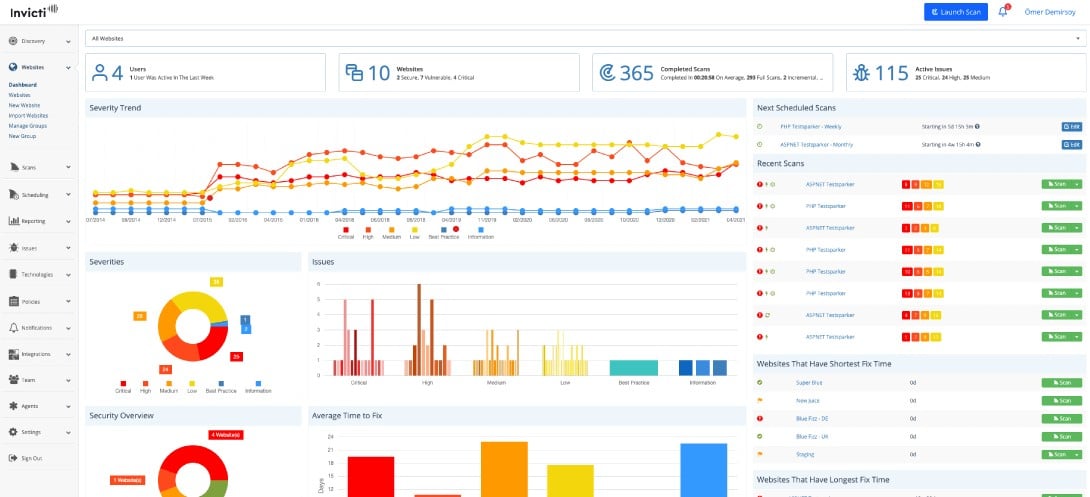
Invicti is a vulnerability scanner for Web application exploits. Tests are launch through a browser with a crawler, and they can be run on-demand or set up for continuous testing. The scanner runs through the CVE list of known exploits, and it also applies heuristics to spot possible combinations of utilities that could be used to launch an attack.
Key Features:
- Dynamic Web Scanning: Enables interactive and comprehensive scanning of web applications for vulnerabilities.
- Module Discovery: Identifies supporting modules that could affect the security of web applications.
- Source Code Analysis: Checks open-source components for known vulnerabilities.
- Comprehensive Coverage: Scans APIs, frameworks, and services to ensure thorough security testing.
- Weakness Identification: Pinpoints and clarifies potential security weaknesses within applications.
Why do we recommend it?
Invicti is a vulnerability scanner. It can be used for on-demand weakness scanning, which is a necessary stage in penetration testing and hacking. This package used to be called Netsparker. It is intended for security testing of Web applications to discover design errors that could be used by hackers to get into the supporting server.
Each scanning run can be customized to only focus on specific Web applications and also to only search for specific exploits. In addition, it is possible to set up parameters for the test in the settings screen of the tool, so you could work out, through trial and error, which values would trigger weakness and compromise the application.
Who is it recommended for?
The main market for Invicti lies with the developers and managers of Web applications. This includes the creators of APIs and SaaS platforms. Companies that get an income from running services that are going to be used by other businesses have the responsibility of ensuring they are secure.
Pros:
- Rapid Scanning: Offers quick and efficient scanning capabilities for web applications, minimizing downtime.
- Flexible Testing: Allows for both on-demand and automated, scheduled vulnerability scans.
- Customizable Tests: Provides the option to tailor testing parameters to specific needs or vulnerabilities.
Cons:
- Limited to Web Applications: Does not include capabilities for testing vulnerabilities within internal networks.
Invicti is available as a SaaS platform and also for installation on Windows and Windows Server.
3. Acunetix
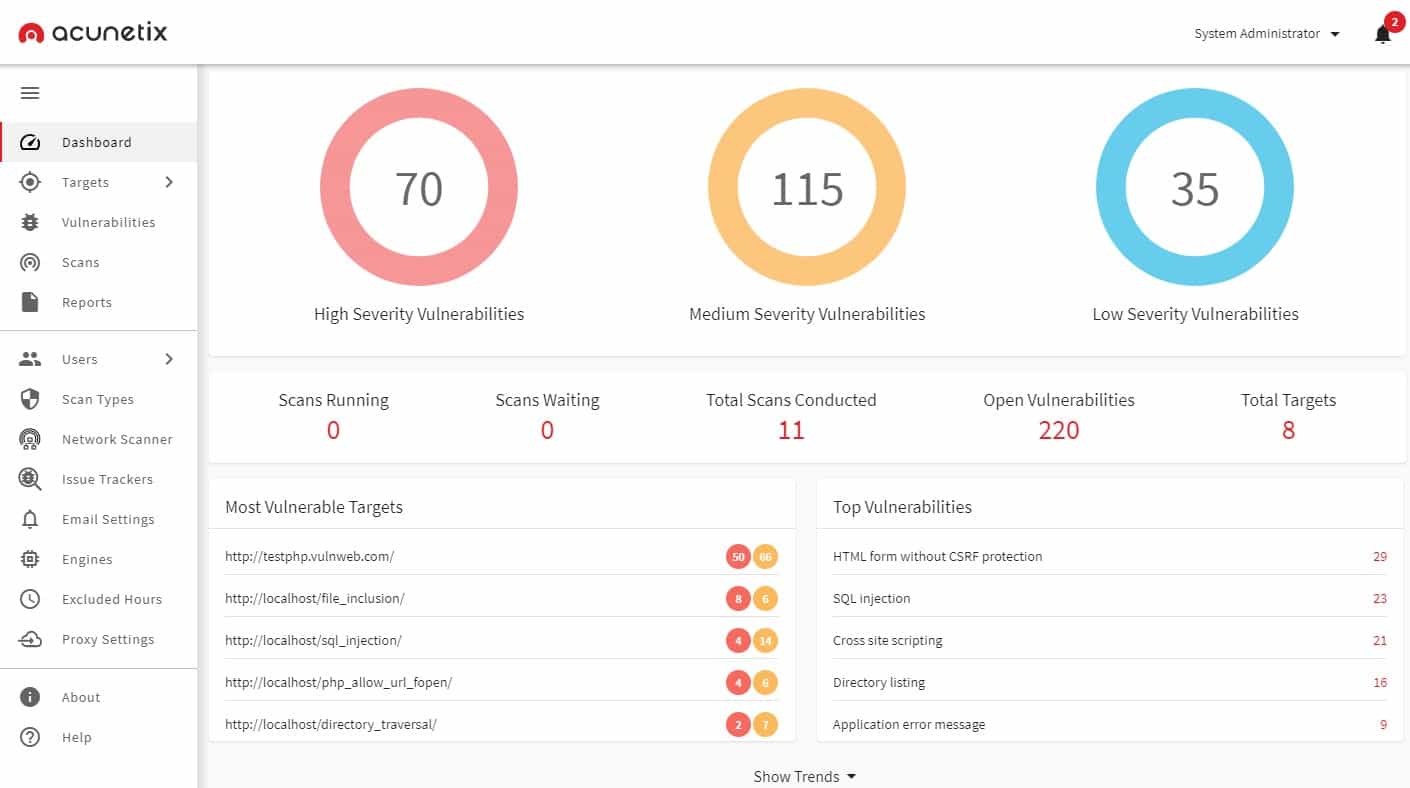
Acunetix is a vulnerability scanner that identifies threats to Web applications and networks in an ethical hacking research sweep. The system can scan a network from an external viewpoint and then perform an internal vulnerability sweep.
Key Features:
- External Network Scanning: Conducts thorough scans from an outsider’s perspective to identify vulnerabilities.
- Internal Network Analysis: Performs deep scans within the network to find and address security weaknesses.
- Weakness Detection: Pinpoints cohesion issues that could be exploited by attackers.
- Automated Scanning: Streamlines the vulnerability research process through automation.
Why do we recommend it?
Acunetix is very similar to Invicti and is a property of the same company. This service looks at how hackers would try to attack a system externally. However, it can also by extended by integrating the OpenVAS tool to perform internal scanning around the network as well.
It is available in three editions. The first of these is called Standard, and it only allows for the external scan of networks and Web applications. This provides on-demand vulnerability scanning. The middle edition, called Premium, is the one to go for if you need an ethical hacking tool. This scans for 7,000 external threats and also looks for 50,000 exploits from within the network.
This tool is also capable of providing continuous testing for applications under development. The highest plan, called the Enterprise Edition, is mainly a testing system for development projects, including the Web application vulnerability scanner.
Who is it recommended for?
This package, like Invicti, is designed for use by the producers and managers of Web applications. The tool can be integrated into a CI/CD pipeline and triggered by the storage of completed modules in a code repository. This ensures that all security issues are checked before an application is deemed to be finalized.
Pros:
- Comprehensive Scanning Capabilities: Capable of identifying both external and internal network vulnerabilities for complete security coverage.
- Web Application Security: Specializes in uncovering vulnerabilities within web applications, offering a focused approach to web security.
- Flexible Testing Options: Supports both on-demand and continuous testing, catering to different development and security needs.
Cons:
- Limited Offensive Tools: While it excels in vulnerability detection, it does not have capabilities to simulate attacks.
Acunetix is available as a hosted Software-as-a-Service platform. It can also be installed on Windows, macOS, and Linux.
4. Havij
Havij offers SQL injection and database attacks in a very similar way to Sqlmap. Havij is older than Sqlmap, and it is available for Windows. A significant advantage that Havij has over Sqlmap is that it has a GUI interface. The screen for Havij has buttons on it that enable you to switch between available functions and attack strategies.
Key Features:
- No Cost: Havij is freely available, making it accessible for everyone interested in SQL injection testing.
- Database Penetration: Specializes in performing sophisticated database attacks to identify vulnerabilities.
- Credential Cracking: Comes equipped with a powerful mechanism for cracking user credentials.
Why do we recommend it?
Havij is one of many SQL injection tools that you could choose. The tool will run through a long list of tricks without manual intervention. It can give you a fingerprint of the technology that you are hacking, such as the DBMS and you can also get account credentials.
Havij first scans a website or API and probes it for a database behind the scenes. It can work out which type of DBMS runs the database and scan for possible user names. The package includes a credentials cracker. Once in, the tool can extract the database structure, offering a list of tables, which can be queried further to extract data.
Who is it recommended for?
This tool is free to use and is a typical hacking system, so you would need to get to know this system or one of its rivals, such as SQLmap in order to carry out an ethical hacking investigation. Havij runs on Windows and will probe remote systems, such as websites.
Pros:
- User-Friendly Interface: Features a graphical user interface (GUI) that simplifies the operation of SQL injection attacks.
- DBMS Identification: Capable of identifying the underlying database management system (DBMS) of a target website.
- Data Extraction Capabilities: Allows for the extraction of database structures and data, facilitating thorough security assessments.
Cons:
- Lack of Updates: The tool’s codebase has not been updated in a while, which might affect its effectiveness against newer security measures.
Havij is free to use.
Ethical hacking tools FAQs
What are the ethical hacking tools?
Ethical hacking tools are utilities that penetration testers use to probe systems for weaknesses and try to exploit them to find out how hackers could get into the system.
Do hackers use Kali Linux?
Kali Linux includes about 300 tools that are suitable for researching system weaknesses and exploiting them. This makes the package ideal for use by hackers. It is also a good toolkit for ethical hackers.

